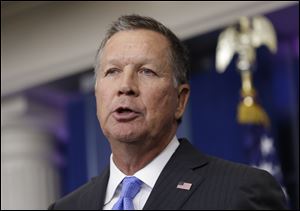
OHIO LAME-DUCK LEGISLATION
Governor criticizes energy tax credits
12/21/2016COLUMBUS — Gov. John Kasich has taken aim at a $264 million “tax incentive” for the energy sector that lawmakers sent to his desk despite a disturbing revenue picture going into next year’s budget debate.

Kasich
The governor had already warned lawmakers that the state may be on the “verge of recession” as tax collections have trailed both projections and last year’s numbers.
“Then I found out they stuck some provisions moving through the legislature that would provide some kind of tax incentives to the energy industry,” Mr. Kasich said last week. “... We don’t have the time to give out more tax credits. We can’t do that.”
The energy provision would expand an existing sales tax exemption that was limited to equipment and other property used “directly in producing” oil and gas. It would now apply to all purchases for items used in all production operations.
The provision is retroactive to tax bills dating to June 30, 2010, and would affect tax disputes already in the pipeline at that time. The Ohio Department of Taxation estimates the state could be on the hook for $215 million in refunds while local governments might have to refund $49 million.
That breaks down to $211 million for conduit pipelines, $46 million for horizontal well operators, and $7 million for injection wells, plus an undetermined amount related to other minerals.
Senate Bill 235 is one of several measures referred to as a lame-duck “Christmas tree” as it was decorated with a number of separate measures.
The bill also includes tax breaks for small business investment companies, plays on jukeboxes and other cash-accepting digital audio devices, and a television program to be produced in Ohio next year.
Another last-minute provision, one that could complicate a veto, is designed to temporarily shore up the state’s weakened unemployment compensation system while lawmakers struggle to come up with a long-term fix.
That provision, to take effect in 2018, would increase the worker wage base on which employers pay taxes from $9,000 to $9,500 per year and freeze worker benefits.
Lobbyists make case
By adding the language, lawmakers have stepped into a dispute between taxation and industry. The Ohio Oil and Gas Association contends the $264 million figure is on state paper only, was never paid, is not owed, and is greatly inflated.
It contends the language is to clarify what has been existing practice to counter “legally unsupported and aggressive audit practices” by taxation.
“It was a clear overreach by the department of taxation, and clarification was needed,” said Shawn Bennett, the association’s executive vice president. “That’s what this language does. It does not cost the state or local governments $264 million.”
He said the meaning of production and exploration was undefined in state law, and this language changes that.
In addition to flying in the face of the budgetary message he’s sent to lawmakers, the language moves in the opposite direction from where the governor has tried to go. He supports an increase in taxes on the oil and natural gas industry as part of broader tax reform that would further cut personal income taxes.
“We still want to have tax reform, because we want to have the state emphasizing a tax system that optimizes economic growth, doesn’t drag on it,” Mr. Kasich said. “How far we’ll get on that? Tough. Too many lobbyists sticking up for their own stuff, some of which is legitimate and some of which is not.”
Contact Jim Provance at: jprovance@theblade.com or 614-221-0496.